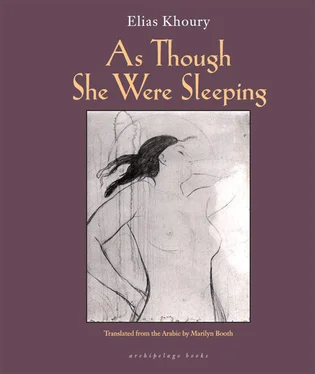Inni!
The “I” came out tilted, slipping, reclining in the Beiruti way.
He did not ask what it signified to call Salim a gullible goose. He did not understand why their elder brother’s embrace of the Catholic faith had generated so much anger.
They’re all alike, he commented.
The mother’s eyes scored him as she pronounced the famous line which she said whenever anyone tried to engage her in dialogue about her son’s new religious choice. God is Orthodox, she said firmly.
But we are not Greek Orthodox, Mansour wanted to say, relying on what a priest in Jaffa had told him. The exchange had taken place in the thick of the heated protests in Palestine against the Greeks who had held sway over the Jerusalem Orthodox Church. The priest had said that the label Rum, even if it had come to refer to Greeks in general, was coined originally as an insult that the followers of the Syriac rite had flung at the Orthodox Arabs, trying to label the latter as agents of the Byzantine Empire. We were Orthodox Arabs who chose to believe in the two natures, divine and human, of the blessed Messiah, peace be upon him, the priest explained. We adopted the Greek part because our small minds somehow accepted our enemies’ accusation. They were able to make it stick.
Mansour told Saadeh and her daughter the story of the priest Yuhanna Aazar. Saadeh began to yawn while Milia, her chin cupped in her hand, gave herself up to her mute slumber. The man did not complete his story. He stopped halfway through, getting to his feet to return to the Hotel Amiirka in the carpenters’ souq where he stayed on his trips to Beirut — now more frequent, ever since he had succumbed to this love.
These feelings that people call passionate love had been alien to his life, Mansour told them. It was true that he was on the threshold of forty, and yes, he had known many women in his life, especially women of the night in Jaffa and Beirut, and he –
Please, please don’t use those filthy words.
I didn’t use any filthy words! I didn’t say anything abusive or insulting, he answered.
Please, that’s enough. No more!
Fine, he said. Anyway, we don’t use abusive language the way young men in Beirut do! You can’t speak to any one of them without their starting to joke with you by tossing out a curse word or two. Kayfak y’akh ish-sharmuta! How are you, Brother-Your-Sister’s-a-Whore! As if he’ll make you love him by saying this. At first I couldn’t bear it, and more than once I nearly got into trouble because of it. Then I got accustomed to it and that was that. There’s no need to get upset, Milia, my love.
He wanted to say to her that in all his past he had never felt the kind of longings that God put inside men to consume them. All it takes is a lowly matchstick to set a man’s entire body alight. He wanted to tell her that, yes, sometimes he had felt a smoldering in his gut that took fire through his body, and then there was not much else a man could do. But after meeting her he was suddenly aware of the emptiness that filled him from his heart to his feet. He felt on fire now, too, but it was different this time, because this was a flame he could not put out. He even wanted to tell her that when thoughts of her had led him to what they called the secret habit , the flame still did not go out. It just moved into his hand. But he didn’t say anything. He was afraid she would be angry and the wound lines on her neck would appear. Whenever a word or an observation upset her, three horizontal scars, from high on her neck down to her chest, glowed red. When he asked her once about the scars she said the nun was to blame.
She went into the bathroom and washed her neck. When she came out it had returned to a pure, undulating white.
This is the color of love, he said.
Mansour told no one that in the Hotel Amiirka fire and jealousy had burned his tongue. He sensed something mysterious in the unfinished story of Salim, and he had an uneasy feeling that somehow Milia was implicated in the rift that had broken the family’s collective spine. But it was only three months after the wedding that he learned the whole story. And then it dawned on him that the red scars on his wife’s neck were the remnants of a wound inflicted by a man called Najib Karam on a woman who had waited and waited for him.
You mean — you loved him?
No, not love . But something like it.
What does that mean?
I mean, it was as if we were engaged, and then he disappeared. And I realized that it was my brother Salim’s fault. Salim was fond of a girl named Angèle. Her father, who gave himself the demeanor of a saintly man, said to her, I won’t marry you off until your big sister marries. I don’t know exactly what happened but suddenly Salim and Najib were gone. And then we heard they had opened a carpentry shop together in Aleppo. Salim did not dare to tell us anything. My mama said he got married on the run. But my mother knew everything anyway. The nun told her about a grand wedding in Aleppo, two sisters married off on the same day; she said Salim had convinced Najib to leave everything and come with him because the family was rich. I don’t know the details. Ask Musa, he knows it all.
When Musa had come home Milia was waiting for him. She had lit a candle and seated herself on the little sofa in the corner of the room to wait. Everything was asleep — everything and everyone but the girl covered in grief and shame. She put her trust in the darkness and waited, a fire burning inside her, feelings of jealousy squeezing her, and a painful emptiness hollowing out her body from her heart to her hip bone. How, she wanted only to know, how and why was it possible for everything to change in this way? And how had Najib managed to love two women at the same time? She told Musa that she was certain Najib loved her. Had he also loved that woman who became his wife?
Milia heard the story in broken fragments dropping from her brother’s lips. Everything turned to shadows. Najib became a shadow of Najib. The hand that had reached for her body became a black shadow of a black hand. Even that explosion she had witnessed on her fiancé’s face, like a reflection of her white breasts erupting in his eyes, became nothing more than a shadow. She said she no longer remembered anything of the story except for a few remnants which she saw occasionally in her dreams. What could she tell of it, then? Even the encounter in the garden, which left traces of red on her neck she recalled only as a dream. How could she tell Mansour what he wanted to hear that night? And why did he want a story that had died?
There are different kinds of stories, she told him. Two kinds — stories that end and stories that die. A story that has ended we bring back by telling it, and then it lives on with us. But a story that has died goes out like a lamp with no more wicking. How can a person read in the dark? You’re asking me to read in the dark and I don’t know how to do that.
She tried to tell him that story but it came out confused, lacking any sequence or causal connection. So he understood nothing and he was certain she was lying. He told her she was lying. What she almost said was, Fine, what do you want me to do? You want me to tell it all to you when I have forgotten, you want to know what happened when I don’t even know. What do you want me to say? Tell me and I’ll say it.
And then she did say it, anyway; she told him a dead story. She did not tell him about what had happened in the garden or about the deep scratches on her legs from the stinging nettles when she had to step back as Najib pressed himself on her. She did tell him about being betrayed.
She tried to explain to him the difference between stories that have ended and stories that have died. All families have at least one buried story that no one dares to unearth, she said. Her story with Najib was one of those, and she remembered it only in the form of muddled and disconnected scenes from old dreams which she could not organize into words. Here she began to recognize that she must stop talking like this, her words like a succession of images before her eyes. Otherwise the poor man would not understand anything at all. More than once he had admitted to her that he could not absorb or comprehend what she said. At first, his inability to follow had surprised her, but gradually it dawned on her that he did not understand because he could not glide with her to that subterranean place where words slipped and dove and circled. Words were Milia’s means of sliding effortlessly, from one word to another, or from a single word to a cluster of images. She was no longer capable, when she spoke, of regaining the thread where it first wound off the spool. For her, the thread had no end. She spoke as though wrapping threads over other threads, winding and unwinding spool after spool. Her sequences did not, could not, tie up any loose ends.
Читать дальше












